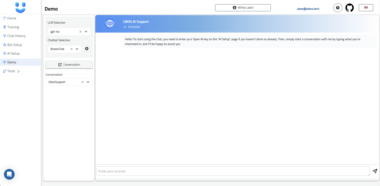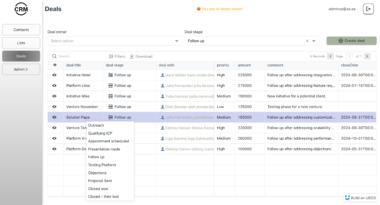Unleash the Power of Chemical Data with the PubChem MCP Server
In the rapidly evolving landscape of AI and machine learning, accessing and interpreting complex data is paramount. The PubChem MCP (Model Context Protocol) Server emerges as a crucial tool, bridging the gap between AI assistants and the vast repository of chemical information housed within PubChem, the world’s largest collection of freely accessible chemical information.
What is the PubChem MCP Server?
The PubChem MCP Server is designed to empower AI models with the ability to search, retrieve, and analyze chemical compound data seamlessly. By adhering to the Model Context Protocol (MCP), this server standardizes how applications provide contextual information to Large Language Models (LLMs). This standardization enables AI assistants to programmatically interact with PubChem’s extensive database, opening up a world of possibilities for researchers, scientists, and developers.
Why is the PubChem MCP Server Important?
- Enhanced AI Capabilities: Equips AI assistants with the knowledge and tools to understand and manipulate chemical data.
- Streamlined Research: Accelerates the process of chemical research by providing AI-powered search and analysis capabilities.
- Improved Data Accessibility: Simplifies access to PubChem’s massive database for AI models.
- Interoperability: Ensures seamless integration with various AI platforms and tools through the MCP standard.
Key Features and Benefits
- Compound Search: Enables AI to search PubChem for compounds by name, SMILES (Simplified Molecular Input Line Entry System) notation, or CID (PubChem Compound ID).
- Chemical Structure Retrieval: Provides access to molecular structures and identifiers for compounds of interest.
- Property Data Access: Allows AI to retrieve detailed chemical and physical properties, such as molecular weight, melting point, and boiling point.
- Advanced Search Capabilities: Supports complex queries combining multiple parameters for precise chemical searches.
- (Future) Molecular Visualization: Plans to generate and display molecular structures in 2D or 3D formats for enhanced understanding.
- (Future) Property Analysis: Aims to enable AI to compare properties across multiple compounds, facilitating comparative analysis.
- (Future) Local Storage: Intends to allow users to save frequently used compounds for faster access, improving efficiency.
- (Future) Chemistry Prompts: Will offer specialized prompts to guide AI in chemical analysis tasks.
Core Functionalities Explained:
- Search by Name: This feature allows users to search for chemical compounds using their common or IUPAC names. The AI assistant can then retrieve a list of matching compounds, along with their basic information, such as the CID, molecular formula, and molecular weight.
- Search by SMILES: SMILES is a linear notation for describing the structure of chemical molecules. This feature enables users to search for compounds based on their SMILES string, which is particularly useful for identifying compounds with specific structural features.
- Search by CID: Each compound in PubChem is assigned a unique CID. This feature allows users to directly retrieve detailed information about a specific compound by providing its CID.
- Advanced Search: This feature combines multiple search parameters, such as name, SMILES, and molecular formula, to perform more targeted searches. This is useful for narrowing down the search results and finding compounds that meet specific criteria.
Getting Started
Installing the PubChem MCP Server is straightforward, with options for both automatic and manual installation.
Installation Methods:
- Smithery: Use the Smithery CLI for automated installation with Claude, Cursor, or Windsurf.
- Manual Installation: Install using
uvor clone the repository for development purposes.
Example Usage:
Once installed, the server can be used through simple Python code snippets. For instance, searching for aspirin by name is as easy as:
python result = await mcp.use_tool(“search_pubchem_by_name”, { “name”: “aspirin”, “max_results”: 3 }) print(result)
This code tells the AI assistant to search PubChem for compounds matching the name “aspirin” and return the top 3 results.
Integration with AI Platforms
The PubChem MCP Server is designed to integrate seamlessly with popular AI platforms such as Claude, Cursor, and Cline. Integration instructions are provided for each platform, allowing users to quickly incorporate the server into their existing AI workflows.
Example: Claude Desktop Integration
To integrate with Claude Desktop, users need to add a configuration snippet to their claude_desktop_config.json file, specifying the command and arguments for running the PubChem MCP Server.
Use Cases
The PubChem MCP Server unlocks a wide array of potential applications across various domains:
- Drug Discovery: AI can analyze vast libraries of chemical compounds to identify potential drug candidates, predict their properties, and optimize their structures.
- Materials Science: AI can design new materials with specific properties by searching for and analyzing existing compounds with similar characteristics.
- Environmental Science: AI can identify and assess the environmental impact of chemical pollutants by searching for and analyzing their properties and behavior.
- Chemical Education: AI tutors can use the PubChem MCP Server to answer student questions about chemical compounds and concepts.
Scenario Examples:
- A researcher is investigating a new drug target and wants to identify potential drug candidates. They can use the PubChem MCP Server to search for compounds that bind to the target protein and have desirable properties, such as high potency and low toxicity.
- A materials scientist is designing a new polymer with specific mechanical properties. They can use the PubChem MCP Server to search for existing polymers with similar properties and identify chemical building blocks that can be used to create the new polymer.
- An environmental scientist is studying the fate and transport of a chemical pollutant in the environment. They can use the PubChem MCP Server to retrieve information about the pollutant’s physical and chemical properties, such as its solubility, volatility, and degradation rate.
The Future of the PubChem MCP Server
The development team is actively working on expanding the capabilities of the PubChem MCP Server, with plans to add features such as:
- Molecular Visualization: Generating interactive 2D and 3D visualizations of chemical structures.
- Compound Comparison: Allowing AI to compare the properties of multiple compounds.
- Local Storage: Enabling users to save frequently used compounds for faster access.
- Specialized Chemistry Prompts: Providing AI with curated prompts to guide chemical analysis tasks.
Connecting with UBOS: Enhancing AI Agent Development
The PubChem MCP Server finds a natural synergy within the UBOS (Ubiquitous Business Operating System) ecosystem. UBOS is a full-stack AI Agent development platform focused on bringing AI Agents to every business department. Here’s how the PubChem MCP Server enhances the UBOS platform:
- Expanding AI Agent Knowledge: The integration of the PubChem MCP Server equips AI Agents built on the UBOS platform with a comprehensive understanding of chemical compounds and their properties. This is crucial for applications in pharmaceuticals, materials science, and environmental monitoring.
- Orchestrating Chemical Data Analysis: UBOS enables the orchestration of AI Agents to perform complex chemical data analysis tasks. The PubChem MCP Server provides the necessary data access, while UBOS manages the workflow and coordination of multiple AI Agents.
- Custom AI Agent Creation: The UBOS platform allows developers to build custom AI Agents tailored to specific chemical research needs. The PubChem MCP Server serves as a fundamental building block for these agents, providing them with the necessary chemical knowledge.
- Multi-Agent Systems for Chemistry: UBOS facilitates the creation of Multi-Agent Systems (MAS) for addressing complex chemical challenges. The PubChem MCP Server can be integrated into multiple agents within the MAS, enabling collaborative problem-solving in areas such as drug discovery and materials design.
In conclusion, the PubChem MCP Server is a valuable tool for anyone working with chemical data and AI. By providing a standardized interface to PubChem’s vast database, this server empowers AI models to perform complex chemical analysis tasks, accelerate research, and unlock new discoveries. Its integration with platforms like UBOS further amplifies its potential, paving the way for advanced AI-driven solutions in various scientific and industrial domains.
PubChem MCP Server
Project Details
- JackKuo666/PubChem-MCP-Server
- Last Updated: 4/7/2025
Recomended MCP Servers
Houdini integration through the Model Context Protocol

This MCP server exposes the WeatherXM PRO APIs as MCP tools, allowing clients to access weather station data,...

Claude Desktop 的火山引擎知识库 MCP 服务器

Node.js MCP server using LLMs (Gemini/OpenRouter) for AI-assisted task planning, breakdown, and code review. Designed for Cursor integration.

DARP engine. The MCP search engine for DARP.

An unofficial and community-built MCP server for integrating with https://railway.app
 From vibe coding to vibe deployment. UBOS MCP turns ideas into infra with one message.
From vibe coding to vibe deployment. UBOS MCP turns ideas into infra with one message.





